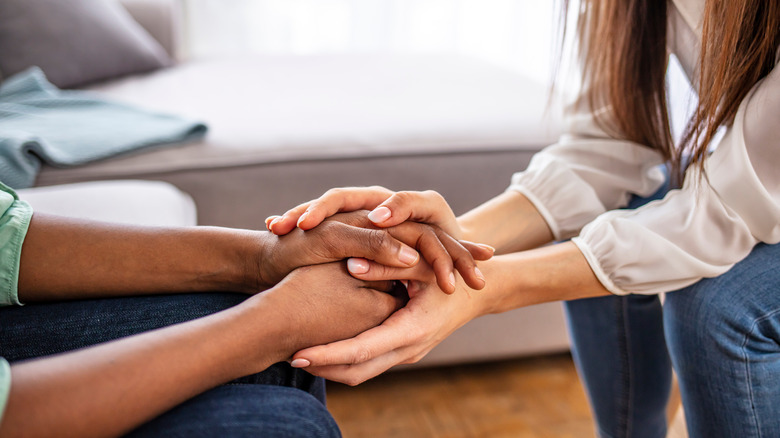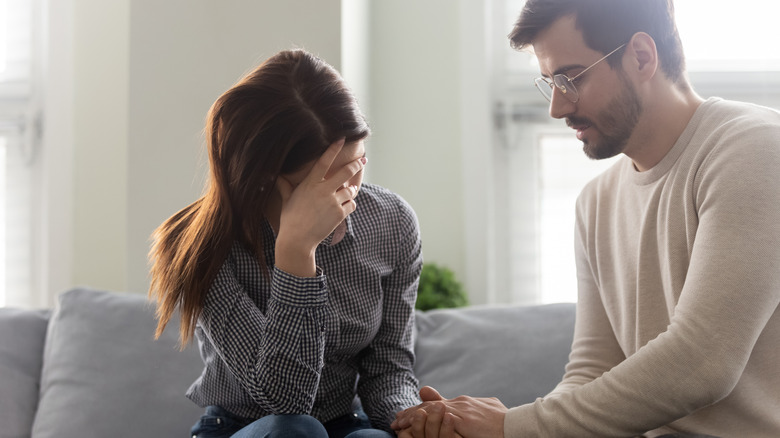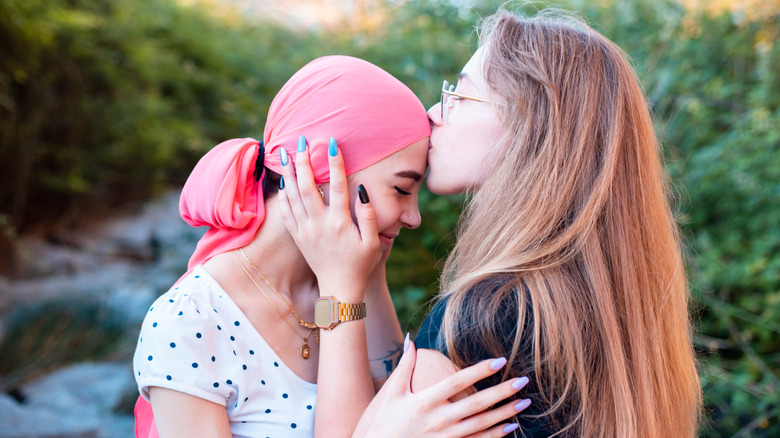What Not To Say To Someone Who Was Diagnosed With Cancer
Being diagnosed with cancer can be a life-changing experience. On one hand, you may feel overwhelmed and hopeless. On the other hand, you may feel you need to be strong and fight for your life, focusing on what you can control rather than what you can't.
People may react in a variety of ways after receiving this diagnosis. Some are in shock and denial and may need to process what they are going through, explains Cancer Council NSW. Others experience anxiety, fear, anger, guilt, or sadness. Most patients can't understand why this is happening to them, and they may end up blaming themselves and their life choices. Coping with a cancer diagnosis is even more difficult if you're alone or surrounded by people who don't know what to say and how to show their support.
The World Health Organization reports that more than 18 million men and women were diagnosed with cancer in 2020. Many types of cancer are curable due to advancements in medical technology, but this doesn't make things easier. Patients often have to change their routines, get surgery, and undergo invasive treatments that can last for months or years. With that in mind, here's what you should never say to someone with cancer — and what you should say, instead.
Here's what you shouldn't say to someone newly diagnosed with cancer
A cancer diagnosis may cause emotional distress, anxiety, and panic attacks note the American Cancer Society. People who are diagnosed may experience restlessness, mood swings, sleep problems, and feelings of guilt or helplessness, all of which can affect their daily lives. The best thing you can do for someone in this situation is listen and show your support. Don't just tell them that everything will be fine — no one knows how things will turn out. Also, refrain from saying things like, "at least it's not a brain tumor or colon cancer. Your condition is treatable." Cancer is cancer, no matter what type, and no one wants to deal with it.
Never say to someone who has cancer that it's their fault. Avoid making statements like, "you should have stopped smoking" or "you should have taken better care of your health." Your friend or loved one may already be feeling guilty — and the last thing you want is to put salt on the wound. Don't tell them you know how they feel or that one of your friends had the same disease. Cancer is a personal experience that affects people in different ways. For example, about two in 10 patients feel depressed about their condition, according to the Knight Cancer Institute at Oregon Health and Science University. Some may feel stronger and find the courage to start all over, while others may experience feelings of grief or loneliness.
Here's how to support a friend who has cancer
This disease is often misunderstood, and many patients end up feeling lonely. For instance, some people believe that cancer can spread from one person to another, notes the Mayo Clinic Health System. Others may ask inappropriate questions or make assumptions instead of showing their support. If you're not sure what to say, just let your friend know you're there for them. Listen without judgment and avoid clichés like, "stay strong, you'll win this battle." Sometimes, a simple "I'm sorry" is enough.
Tell your loved one that you could help them with house chores, doctor's appointments, or whatever they need, recommends Caring Bridge. Don't just ask, "Is there anything I can do for you?" Chances are, they don't want you to pity them. Instead, show your support through your actions. For example, you could say something like, "I could take you to the hospital tomorrow. It's on my way home." Caring Bridge also suggests visiting your friend whenever possible and helping them resume their daily routines.
Encourage them to go out for a walk, watch movies together, or try new activities. What matters most is to help them maintain a sense of control in their lives. Also, refrain from talking about clinical trials and breakthrough treatments. These things may seem like a good choice, but they're not a feasible option for most cancer patients. In such cases, it may be worth speaking with the doctor who is treating your friend.


